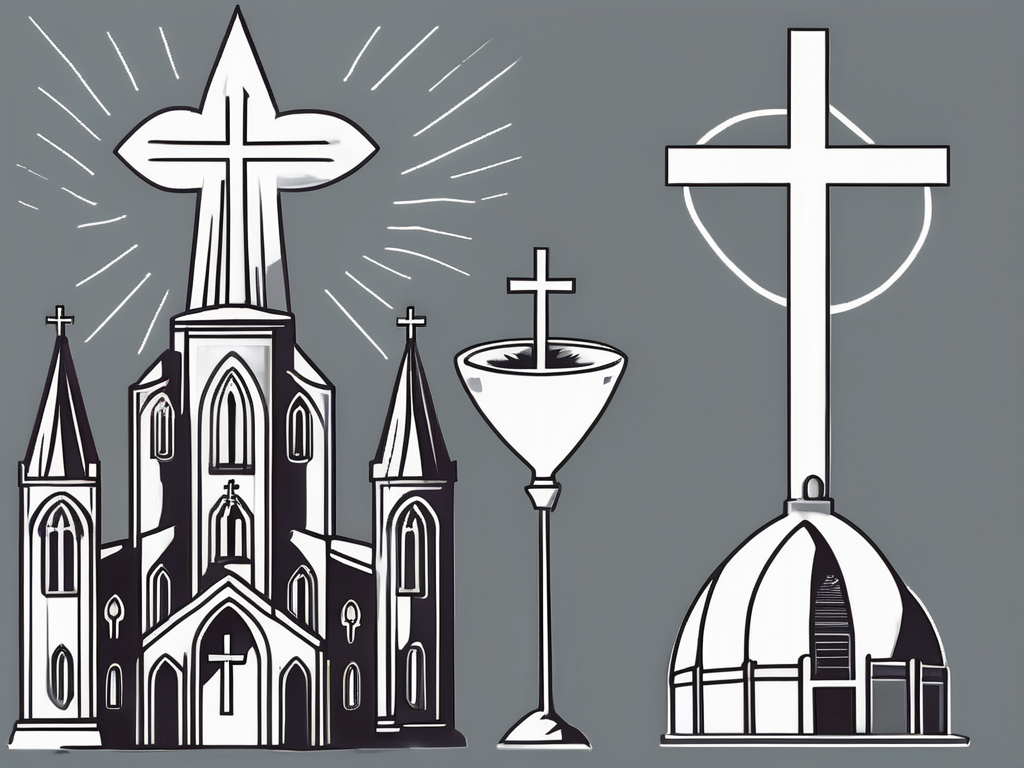In today’s diverse religious landscape, there are numerous denominations that have distinct beliefs and practices. Two prominent Christian groups, the Baptists and the Seventh Day Adventists, each have their own rich histories and theological perspectives. Understanding the similarities and differences between these two groups is essential for fostering religious tolerance and promoting dialogue. In this article, we will explore the core beliefs, historical backgrounds, and societal perceptions of Baptists and Seventh Day Adventists, providing a comprehensive comparative analysis.
Understanding the Baptist Faith
Core Beliefs and Practices
The Baptist faith is rooted in certain core theological beliefs. These include the authority of the Bible as the word of God, the necessity of individual repentance and acceptance of Jesus Christ, and the practice of baptism by immersion. Baptists emphasize personal faith and the free will of individuals to accept or reject salvation.
When it comes to the authority of the Bible, Baptists believe that it is the ultimate source of truth and guidance for their lives. They see it as the inspired word of God and strive to follow its teachings in all aspects of their faith and daily lives. This commitment to the Bible often leads to a strong emphasis on biblical preaching and teaching within Baptist churches.
Another important aspect of Baptist belief is the necessity of individual repentance and acceptance of Jesus Christ. Baptists believe that every person is born with a sinful nature and is in need of salvation. They teach that salvation comes through personal faith in Jesus Christ as Lord and Savior. This personal faith is seen as a conscious decision that each individual must make for themselves.
Baptism by immersion is a distinctive practice of the Baptist faith. Baptists believe that baptism is an outward symbol of an inward change that has taken place in a person’s life. They practice baptism by immersing believers in water, symbolizing their identification with the death, burial, and resurrection of Jesus Christ.
Baptists also emphasize personal faith and the free will of individuals to accept or reject salvation. They believe that each person has the freedom to choose whether or not to accept the gift of salvation offered by God. This emphasis on personal faith and individual responsibility is a key aspect of Baptist theology.
Baptist worship is often characterized by heartfelt singing, biblical preaching, and congregational prayer. Many Baptist churches celebrate the Lord’s Supper, also known as communion, as a way to remember Jesus’s sacrifice. This practice is seen as a time of reflection and spiritual renewal for believers.
Historical Background
Originally emerging during the Reformation era, the Baptist movement draws its roots from dissenting groups that advocated for believer’s baptism and separation of church and state. One of the key figures in Baptist history is John Smyth, who is credited with baptizing himself and subsequently forming the first Baptist congregation in Amsterdam in the early 17th century.
The Baptist movement faced persecution and opposition from both religious and political authorities throughout its early history. Despite this, Baptist churches continued to grow and spread throughout Europe. In the 17th and 18th centuries, Baptist missionaries played a significant role in the spread of the faith to the American colonies.
Throughout history, Baptists championed religious liberty and played a significant role in the development of democratic principles, advocating for the separation of church and state. They believed that each individual should have the freedom to worship according to their own conscience, without interference from the government or any other external authority.
Today, Baptist denominations are widespread, with varying degrees of theological diversity and organizational structures. There are numerous Baptist associations, conventions, and fellowships that provide a sense of unity and support among Baptist churches. While there are core beliefs and practices that unite Baptists, there is also room for individual interpretation and variation within the faith.
Modern Day Influence
Present-day Baptists continue to have a profound impact on society. Their commitment to individual religious freedom and missionary work has led to the establishment of educational institutions, hospitals, and social service organizations. Baptist churches can be found in almost every corner of the world, with a significant presence in North America, Latin America, Africa, and Southeast Asia.
Baptist educational institutions, such as colleges and seminaries, play a vital role in training future pastors, missionaries, and Christian leaders. These institutions provide a solid theological foundation and practical training for individuals called to serve in various ministries within the Baptist faith.
In addition to education, Baptists are also actively involved in providing healthcare services. Many Baptist hospitals and medical centers are known for their commitment to compassionate and quality care. These institutions often have a strong emphasis on serving the underserved and marginalized populations, reflecting the Baptist belief in the value and dignity of every human life.
Missionary work is another significant aspect of Baptist influence. Baptists have a long history of sending missionaries to share the message of the Gospel and provide practical assistance to those in need. This global outreach has resulted in the establishment of churches, schools, and other community development projects in various parts of the world.
Overall, the Baptist faith continues to impact individuals and communities around the world. Through their core beliefs, practices, and commitment to service, Baptists strive to make a difference in the lives of others and bring glory to God.
Exploring the Seventh Day Adventist Church
Fundamental Beliefs and Practices
The Seventh Day Adventist Church is built upon a foundation of unique theological beliefs. These include the observance of the seventh-day Sabbath (Saturday), the imminent return of Jesus Christ, and an emphasis on holistic health principles and vegetarianism. Seventh Day Adventists believe in the concept of soul sleep, where the dead remain unconscious until the resurrection.
Adventist worship services typically involve Bible study, prayer, singing, and preaching. The observance of the Sabbath is a key component of their faith, with many Adventists engaging in communal worship and fellowship on Saturdays.
Furthermore, the Seventh Day Adventist Church places a strong emphasis on education. They believe that education is essential for the development of the whole person – physically, mentally, and spiritually. As a result, they have established numerous educational institutions around the world, ranging from primary schools to universities. These institutions provide a nurturing environment where students can grow academically and spiritually, with a focus on character development and service to others.
In addition to their educational endeavors, the Seventh Day Adventist Church is actively involved in healthcare. They view the body as a temple of the Holy Spirit and promote a holistic approach to health. Adventists advocate for a plant-based diet and abstain from consuming alcohol, tobacco, and other harmful substances. Their commitment to health extends beyond personal practices, as they have established hospitals and medical facilities that provide quality care to communities in need.
Historical Context
The Seventh Day Adventist Church traces its origins to the teachings of William Miller in the early 19th century. Miller, a Baptist preacher, predicted the Second Coming of Jesus Christ to occur on October 22, 1844. When this event, known as the Great Disappointment, did not materialize as expected, a group of Miller’s followers, led by Ellen G. White, formed the foundation of what would become the Seventh Day Adventist Church.
Over time, the church grew, spreading its message of religious reform and healthful living. Today, the Seventh Day Adventist Church is known for its extensive healthcare and educational systems, which include hospitals, universities, and medical missionary work around the world.
One significant aspect of the church’s historical context is the role of Ellen G. White. As one of the church’s founders, she played a crucial role in shaping its beliefs and practices. White is considered a prophetess by Seventh Day Adventists, and her writings are highly regarded as inspired by God. Her works, including books such as “The Great Controversy” and “Steps to Christ,” provide guidance and spiritual insights for Adventists.
Contemporary Impact
The influence of Seventh Day Adventists extends beyond their religious communities. Their vegetarian dietary practices, emphasis on healthful living, and longevity research have contributed to a greater societal awareness of the benefits of good nutrition and preventive care. Adventist institutions also play a vital role in providing quality education and healthcare in various regions.
Moreover, the Seventh Day Adventist Church is actively involved in humanitarian efforts worldwide. They are committed to serving others and have established numerous initiatives to address social issues such as poverty, hunger, and disaster relief. Through their charitable work, they strive to make a positive impact on the lives of individuals and communities, regardless of their religious affiliation.
Furthermore, the church’s emphasis on environmental stewardship is increasingly relevant in today’s world. Adventists believe that God has entrusted humans with the responsibility to care for the Earth and its resources. As a result, they promote sustainable practices and advocate for environmental conservation. This commitment to preserving the planet aligns with global efforts to address climate change and promote a more sustainable future.
Key Similarities Between Baptists and Seventh Day Adventists
Shared Theological Perspectives
Despite their differences, Baptists and Seventh Day Adventists share common theological ground. Both groups view the Bible as a central authority for faith and practice. Both emphasize the importance of personal faith and the acceptance of Jesus Christ as the means of salvation. Additionally, both Baptists and Seventh Day Adventists maintain a commitment to evangelism and spreading their respective religious beliefs.
When it comes to their shared theological perspectives, Baptists and Seventh Day Adventists also hold similar beliefs regarding the nature of God. Both groups affirm the belief in the Trinity, understanding God as three distinct persons – Father, Son, and Holy Spirit – in one divine being. This shared understanding of the Trinity shapes their understanding of God’s character and work in the world.
Furthermore, both Baptists and Seventh Day Adventists share a belief in the importance of baptism. While the practices and modes of baptism may vary between the two groups, they both affirm the significance of baptism as a public declaration of one’s faith and a symbol of spiritual rebirth.
Common Practices and Traditions
While their worship styles may differ, Baptists and Seventh Day Adventists share a commitment to engaging in communal worship and actively participating in church activities. Both groups place importance on prayer, congregational singing, and studying the Bible as a means of spiritual growth.
In addition to these common practices, both Baptists and Seventh Day Adventists value the observance of the Lord’s Supper, also known as Communion. This sacrament holds deep significance for both groups as a remembrance of Jesus’ sacrifice and a symbol of their unity as believers.
Furthermore, both Baptists and Seventh Day Adventists prioritize the importance of Sabbath observance. While their specific practices and beliefs surrounding the Sabbath may differ, both groups recognize the significance of setting aside a day for rest, worship, and spiritual renewal.
Another common practice shared by Baptists and Seventh Day Adventists is the emphasis on community outreach and service. Both groups actively engage in various forms of social and humanitarian work, seeking to make a positive impact in their local communities and beyond.
Lastly, both Baptists and Seventh Day Adventists value the importance of education. Both groups have established educational institutions, including schools and universities, to provide a holistic education that integrates faith and learning.
Distinguishing Differences Between Baptists and Seventh Day Adventists
Theological Discrepancies
One significant difference between the two groups lies in their beliefs about the Sabbath. While Baptists typically worship on Sundays, Seventh Day Adventists observe the Sabbath on Saturdays, upholding the biblical commandment to remember and keep it holy. Another notable difference is the belief in the concept of soul sleep held by Seventh Day Adventists, which is not as prevalent within Baptist theology.
Differences in Worship and Practices
The worship practices of Baptists and Seventh Day Adventists also diverge in certain areas. While both engage in congregational singing, preaching, and prayer, the observance of the Lord’s Supper, baptismal practices, and church governance structures may differ between the two groups. For example, Baptist churches often practice baptism by immersion, while Seventh Day Adventists may also accept other forms of baptism.
Societal Perceptions and Misconceptions
Common Misunderstandings About Baptists
Baptists have sometimes been misunderstood and stereotyped. Some perceive them as overly strict or legalistic in their approach to faith. However, it is important to note that Baptist beliefs and practices can vary widely among different congregations, and generalizations may not accurately represent the diversity within the Baptist community.
Misconceptions Surrounding Seventh Day Adventists
Similarly, Seventh Day Adventists are subject to common misconceptions. Some mistakenly believe that they are a cult or that they exclusively focus on end-time prophecies. In reality, the Seventh Day Adventist Church is a mainstream Christian denomination with a comprehensive set of beliefs and practices that extend far beyond their distinctive emphasis on the Sabbath.
In conclusion, a comparative analysis of Baptists and Seventh Day Adventists reveals both shared theological perspectives and distinguishing differences. While both groups hold the Bible as authoritative and emphasize personal faith, their beliefs about the Sabbath and doctrines like soul sleep set them apart. Understanding and appreciating the nuances of various religious traditions fosters greater tolerance and promotes the spirit of religious dialogue in our diverse society.












